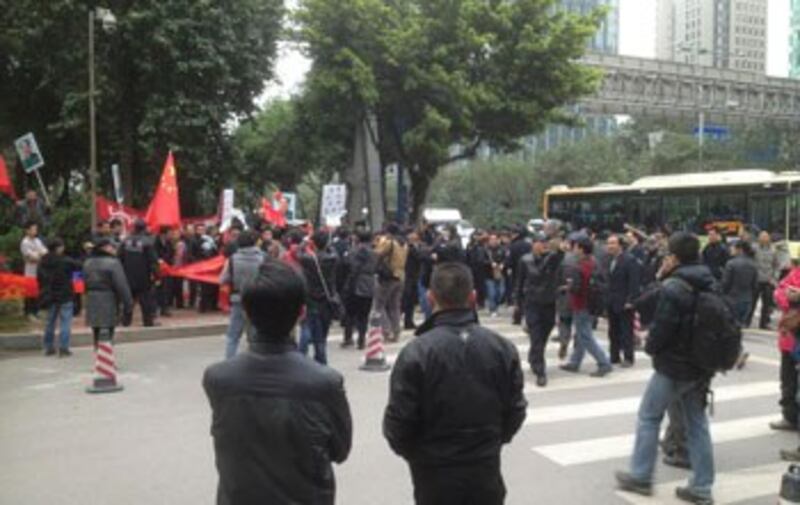As authorities in the southern Chinese province of Guangdong on Wednesday brokered a deal with a cutting-edge newspaper following protests over censorship, police detained activists who had supported the journalists' campaign.
Under the terms of the deal, reported by major Western news outlets, propaganda officials will refrain from rewriting articles before they appear in the Southern Weekend newspaper, which has been at the center of a campaign against censorship in recent days.
While the deal defuses a standoff by ensuring that striking journalists put out a paper as normal on Thursday, it is unlikely to put a real dent in the power of the ruling Chinese Communist Party's central propaganda department.
According to Reuters and the Associated Press, editors and reporters will not be punished for protesting and stopping work in anger over a propaganda official's reworking of a New Year's editorial calling for political reform to a paean of praise to the Party.
One editor told the AP the propaganda officials will no longer directly censor content prior to publication. However, an end to propaganda directives, self-censorship by editors and reporters, and dismissal of those who do not comply with the Party line is unlikely.
The paper's editor, Huang Can, will also likely lose his job, Reuters said.
"If that's the case, we've got a small victory for the media," said David Bandurksi, an expert on Chinese media at Hong Kong University, told the AP.
He said the compromise, at best, could see censors behaving in a less "ham-fisted" manner.
Fresh protest
Several hundred protesters, coordinated via online posts, showed up again on Wednesday outside the paper's Guangzhou headquarters, participants said.
A protester identified by his online nickname "Xiao Biao" said there was a brief shouting match once again between anti-censorship protesters and government supporters, known as the "50 cent party" because they are believed to be paid to support the Party line.
"It was a very short disturbance, lasting just a minute or two," Xiao Biao said. "It was mostly verbal clashes, and it got a bit fierce, but I didn't see any physical confrontation."
"I saw [police] take away one 50 center, however."
A Guangzhou-based poet known online as "Lang Zi" said he was detained by state security police on Wednesday on suspicion of "illegal assembly" and held for seven hours, before being released in the evening.
He said via Twitter that he had been forced to write a declaration promising not to leave home for three days, and not to return to the Southern Weekend offices.

Protesters detained
Posts on popular microblogging sites suggested that as many as 29 protesters were detained or questioned by police in connection with the dispute.
Guangzhou-based activist Wu Wei, who is known by his pen name Ye Du, said he was detained for "illegal assembly."
"They wanted to ask about the entire Southern Weekend campaign and everything that had been put out on the microblogs," Ye said on Wednesday.
He said he had been strip-searched at the police station, questioned at length, then told not to go out or give media interviews.
"But there are some things which I think I should talk about," he said. "I'm not going to swallow this; I demand an explanation from them for their treatment of me."
Hangzhou activists
In Eastern China, Hangzhou-based dissident Mao Qingxiang was detained Tuesday evening on suspicion of "incitement to subvert state power," while fellow Hangzhou activist Lu Gengsong said his home had been searched.
"It was because I signed in support of Southern Weekend," Lu said on Wednesday. "This is ridiculous behavior on their part, because this isn't really a big deal."
"The campaign for Southern Weekend was nationwide, so they are really out of line," he said. "They violate our human rights, search my home over the tiniest thing."
"Yesterday evening, I refused to answer their questions, and they held me for 12 hours."
Those who express dissenting political views, or who call for major changes to one-party rule in China, are often harassed, held under house arrest, or sent to prison for subversion or unrelated charges.
Open letter on censorship
Analysts said the Guangzhou protest was one of the first overt calls by members of the public for political freedom since large-scale pro-democracy demonstrations were crushed in a military crackdown in Beijing's Tiananmen Square in 1989.
Last week, 18 Chinese academics signed an open letter calling for the dismissal of Tuo Zhen, a provincial propaganda minister blamed for the censorship. The scholars included legal professors, liberal economists, historians, and writers.
There has been no direct official comment on the confrontation so far.
However, official media have shown little sign of any softening of the Party's stance on censorship in the wake of a leadership transition last year.
Reported by Wen Yuqing for RFA's Cantonese Service and by Xin Yu for the Mandarin Service. Translated and written in English by Luisetta Mudie.
